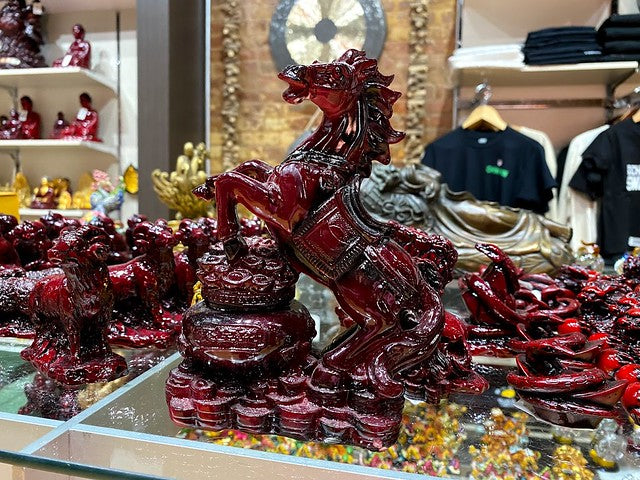
From Heavenly Creatures to Bodyguards in Hell: Five Fun Facts About Horses in Chinese Culture
If you haven't already noticed, we're getting a lot of inspiration from our Brooklyn warehouse finds. One of the latest is this pretty wooden horse statue, which of course means lot of fun facts about horses in Chinese culture.
One mythical creature is having its Hollywood moment
The Longma (literally "dragon horse") has appeared in Chinese texts since ancient times, the earliest of which seems to be a Han period commentary on the Shangshu or Book of Documents, believed to be compiled by Confucius himself. The author of the commentary, scholar Kang Anguo, mentions the legend of a dragon horse which emerges from the Yellow River, the second longest in China, and acts as an auspicious omen.
You can spot this "weird horse" in the fantastic latest Marvel installment, Shang-Chi.
A white horse supposedly carried Buddhism into China
During the latter part of the Han dynasty, Buddhism was brought to China from India, most likely thanks to immigrants who had traveled to the western part of the country, eventually settling in Luoyang, the capital city of Henan province. However, legend says it was two monks and a white horse who carried those ancient Buddhist scriptures. Regardless, the White Horse Temple in Luoyang honors this significant equine and is known as the cradle of Buddhism in China.
A "heavenly" horse helped China win a war
Tianma, or "heaven horse," has a few horsey references. One is a mythical Pegasus-like creature descended from dragons while another is a constellation recognized during the Western Zhou empire. The most well-known perhaps is a revered ancient breed.
The Ferghana horses were native to Central Asia. Taller and more powerful than the horses indigenous to China, they were imported by the Western Han dynasty armies to fight against the invading Huns. Believed to be descended from the mythical tianma, these horses were so tough, they were known to sweat blood, which was actually probably the result of an endemic skin infection or parasite.
While the Ferghana helped the Chinese win "the War of Heavenly Horses," the horse itself would lose out, eventually becoming extinct.
Chinese hell has a horsey bodyguard
The terrifyingly monikered Horse-Face is a kind of gatekeeper to Diyu, or the Underworld in Chinese myth. Along with his partner, Ox-Head (yikes!), they usher in the dead and bring them before the judges.
There's a Year of the Horse of course (of course)
The horse is the seventh sign on the Chinese zodiac. People born in horse years are full of energy — to a fault. They can't keep still! They're also natural-born leaders, clever, funny, and charismatic. On the flip side, they can be self-centered, overly confident, and short tempered. Some famous horse folks include Jackie Chan, Ang Lee, Kazuo Ishiguro, Michiko Kakutani, and our friend Cindy Hsu. The next Year of the Horse is 2026.
Want to learn even more about animals in Asian culture? Check out our posts on cats, elephants, fish, and dragons.